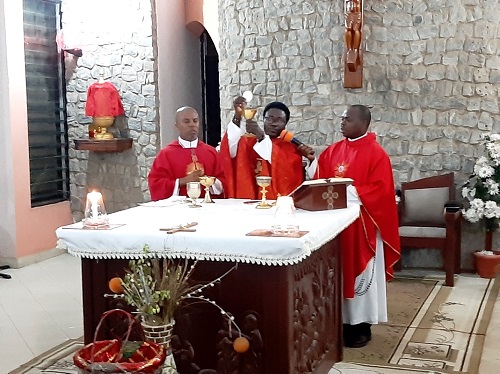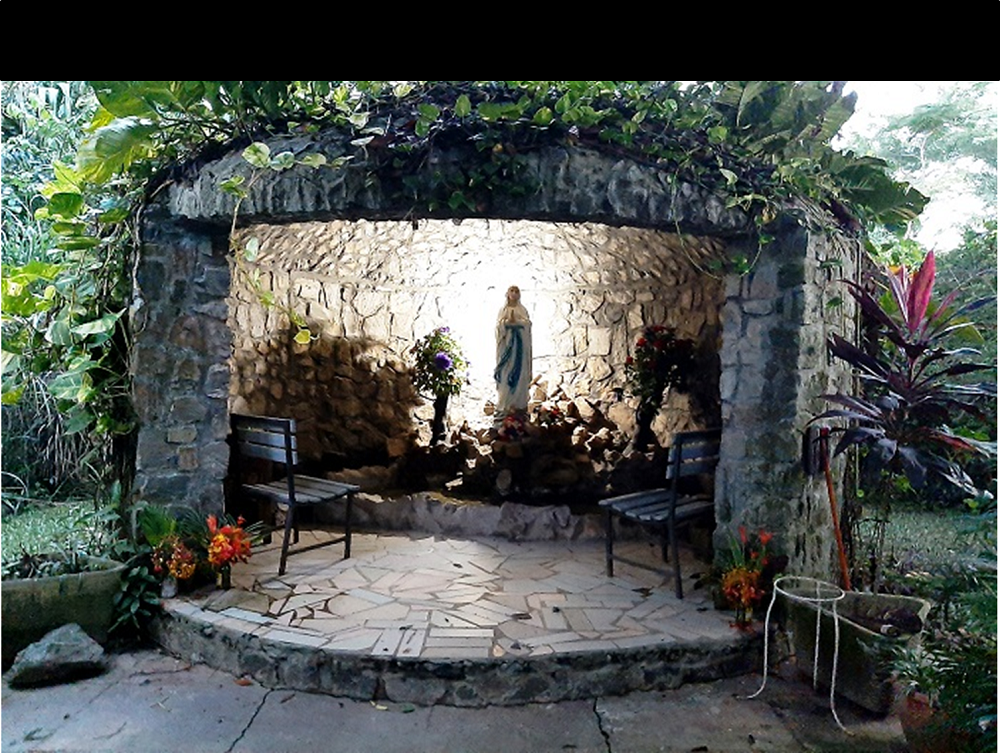WHO IS A REDEMPTORIST BROTHER?
So who is a Redemptorist Brother? Sometime in 2019 I conducted the retreat of five Redemptorist confreres in our Vice Province who were preparing for their final vows. After the final vows ceremony I uploaded some pictures of the confreres at the final vows ceremony to our Facebook page @Redemptorist Vocations Nigeria. One of the comments on the picture was from one of our followers on the page. He had asked why the Redemptorist brothers making their final vows in the pictures I uploaded to the page were not wearing Chasubles (the outer regalia that a priest wears while celebrating holy Mass). Though I have modified it to some extent but what follows was my answer to him and I wanted to share that with the rest of you who would have come to this page to find information about vocation in general.
“Thanks for your question. It is a good question that will help me explain an aspect of church life that does not receive enough attention. A religious Profession of vows is not an ordination. Religious Profession is the entry into a life of consecration in which the Religious vows to live in the image of Christ who is poor, obedient and chaste. So, the Religious makes vows of poverty, chastity and obedience. For a Religious Brother or Sister, perpetual vows is the high point of their vocation in the same way that ordination to the priesthood is the highpoint of the vocation of the diocesan priest.
Clarification
It is important to make a distinction between two types of brotherhood in order to avoid confusion. a) there is a transitional brotherhood and b) there is a permanent Brotherhood. The transitional brother is the seminarian who is studying for the priesthood. His official title in the church is ‘seminarian’ or ‘clerical student’ but we loosely refer to them as brothers.
On the other hand there is the permanent Brotherhood. This type of Brotherhood is the one we speak of in this article as a vocation. A person who is called to this vocation is not in preparation to become a priest. He is called to a life of consecration through prayer and an active life of service to God and his people without feeling the desire to perform the duties of a priest. This vocation is not to be compared with the ministerial priesthood. Both vocations are different and each is beautiful in its own right. However, a person who is called to the vocation of the Religious Brotherhood cannot celebrate the sacraments (Holy Mass, Confession etc) as an ordained priest can. Neither does he desire to perform these sacred functions. The person is completely content and finds deep joy living his life as a consecrated person. It is a full and complete vocation in itself.
This understanding has been in the church since antiquity. As you would know, a lot of monks are not priests. Most of them are brothers. They are fulfilled in their daily striving for holiness and praying for the sanctification of the world. So are religious brothers and sisters! They are content just being either a Redemptorist Brother, a De La Salle Brother, a Dominican or a Franciscan friar, Jesuit or Salesian brother! There are religious Congregations for men that are for both Priests and brothers (e.g Redemptorists, Jesuits, Dominicans, Franciscans, Augustinians etc). While there are also Congregations that are completely for the Brotherhood; De LaSaale Brothers, Presentation Brothers, Little Brothers of St. Francis, Albertine Brothers, Brothers of Mercy of Our Lady of Perpetual Help etc.
The vocation to Brotherhood has suffered a steep decline in recent times. This came as a surprise post Vatican II experience. I say that because Vatican II launched a church for the laity. And since brothers are not on the hierarchical strata of the church it was expected that post Vatican II was going to be the era of the brothers. However several misconceptions about the brother such as seeing the brother as a ‘half priest’ and other factors has made this beautiful vocation suffer decline. It is important to keep in mind that these misconceptions do not change the inherit beauty of this precious vocation. In my little experience as a Redemptorist I have lived with brothers whose experience as Redemptorist brothers are just as fulfilling as their priest confreres. They add more flavor to community life.
Most Brothers specialize in professions that contribute to the growth of the mission of the Congregation in unique ways. For instance brothers have taken up professions like Architecture, Religious art (Iconography),Writing, Library Science, Nursing, Farming, Music etc. They bring the same zeal and fervor expected of every Redemptorist to whatever profession they take up. All is done with the intention of bringing plentiful redemption to as many as they can reach! Yes, they have challenges just like any other confrere but they soldier on in the spirit of the Redeemer! It is indeed for those who are called to it a vocation filled with immense joy and fulfillment!
One of the most popular Redemptorist Saints of all times is St. Gerard Majella (you can find his story on the saints section of this website). He is more known throughout the world as the ‘Mother’s Saint’. He lived a full, joyful and beautiful Redemptorist life. The Lord used him in so many ways to bring plentiful Redemption to many. Though he lived many years ago we are still drinking from his wealth of spiritual treasuries. St. Gerard is a shining example of the beauty of the life of a Religious Brother but more specifically, A Redemptorist Brother!
The Formation Process of a Redemptorist Brother
From the Pre-novitiate to the Novitiate the Redemptorist Brother receives the same formation with his confreres preparing for the Priesthood. This is so because we are fundamentally Redemptorists before anything else. This shared identity is first imprinted in all confreres at this foundational level before the specialization that comes later. Like his clerical counterparts the Brother confrere spends 8-9 months in the first Phase of the Pre-novitiate. He then proceeds to study Philosophy for four years whilst deepening his knowledge of his vocation and learning how to live in community.
This four-year period also doubles as Phase 2 of the Pre-novitiate. After graduation from Philosophy and with the approval of the competent Superior he would be admitted into the Novitiate. The Novitiate is a one-year period of silence, prayer, reflection and learning about the Redemptorist life under the guidance of a competent novice Director. More than any other time in his formation this period is the time when his suitability for the Redemptorist life is most intensely discerned. There is a deeper focus at this stage on the mystery of his calling to consecrate himself to God in this special way and future ministry as a Brother. After this period of discernment if he wishes to commit himself to this way of life and the Congregation discerns that he is well suited for this life he would make his first profession of vows as a Redemptorist. The making of the vows of chastity, poverty and obedience is the first most significant commitment that the formandi makes in his journey into the Redemptorist way of life. At this point he becomes a legal member of the institute.
This ushers him into the one-year period for pastoral experience in a Redemptorist community and apostolate. He would be sent to work in a Redemptorist community where he would be mentored by his pastoral year Director; an older confrere who would journey with him during this time. When this period is over he would enter a prayerful dialogue with this his Superior about his ministry as a Redemptorist Brother. They would discern together the most suitable apostolate that the Brother could embark on. The chosen apostolate would be discerned within the context of the Apostolic priorities of his unit. Once decided, he would be engaged in this activity for at least three years whilst renewing his vows every year. When he completes these years of experiencing the vows and discernment he would apply to be fully admitted into the Congregation by making Perpetual vows.
Perpetual vows for a Redemptorist is the crowning of his years of initial formation and the centre of his consecration. He would make for life the vows of chastity, poverty and obedience together with the vow and oath of perseverance. This ceremony makes the Brother a full member of the Redemptorist Congregation. This, indeed is the most celebrated event in the life of a Redemptorist.
If you are reading this post and you feel God is calling you to a life of consecration but you don’t feel a compelling desire to be ordained for ministerial priesthood then explore it deeper with us. Contact us on this page or send an email to us in the information contained on this page and let us discern together!
If you are reading this but are not discerning a vocation but you have a brother in your parish please appreciate him more. Make him know that you appreciate his calling. Pray for him and encourage him as much as you pray for and encourage your priests.
If you have questions feel free to ask in the comment section below
May St. Gérard Majella pray for the vocation to the brotherhood and may his intercession guide all young people who wish to discern their vocation on this path radical simplicity and joy! Amen.
For an exhaustive list of Religious Orders click on: https://www.translationdirectory.com/articles/article2296.php

REQUIREMENTS FOR APPLICATION TO JOIN THE REDEMPTORISTS
1. Aspirants must be at least 18 years of age.
2. Aspirants must possess Senior Secondary Certificate or its equivalent (WAEC OR NECO) with 5 credits including English language, Mathematics, Christian Religious Studies and two other subjects of choice.
3. Subject combination for University of Ibadan UTME (JAMB) qualification include English language, Christian Religious Studies and two other subjects of choice (consult the UTME brochure).
4. Aspirants must possess the original copy of their baptismal card.
5. Aspirants must have received all the sacraments of initiation (Baptism, Confirmation and Eucharist) before applying.
6. Aspirants between ages 18 -20 must possess at least SSCE or its equivalent (WAEC OR NECO). Aspirants who have attained a qualification from a tertiary institution must be 24 years or below.
7. Aspirants must come with the understanding that we are a missionary Congregation and therefore should be open to the learning of new languages. French is MANDATORY as part of the academic formation will be in French.
8. Aspirants will be expected to possess both typing and driving skills. Though these will be taught during the first stages of formation however an aspirant who already possesses these skills might stand a better chance.
In addition to the above it is important to highlight the fact that as a Congregation Parish ministry is NOT our primary focus. We are first and foremost missionaries. Our communities exist for the sake of the mission.
This ‘’mission attitude’’ is necessary for anyone who wishes to join our way of life. It also means that the aspirant must not be attached to any ideas of where they are to function as members of the Congregation but must possess a generosity of spirit and an openness to be sent wherever and whenever the Congregation needs them.
The Structure of our Congregation in Africa and Madagascar requires that a Redemptorist be ready to work in varied ministries in any part of Africa that our Apostolic life demands of us.God bless you!
If you would like to support us in the formation of our students please click this DONATE Link.
CLICK HERE TO DOWNLOAD AND FILL THE FORM.
ALL FILLED forms should be submitted to
redemptoristvocationsng@gmail.com






